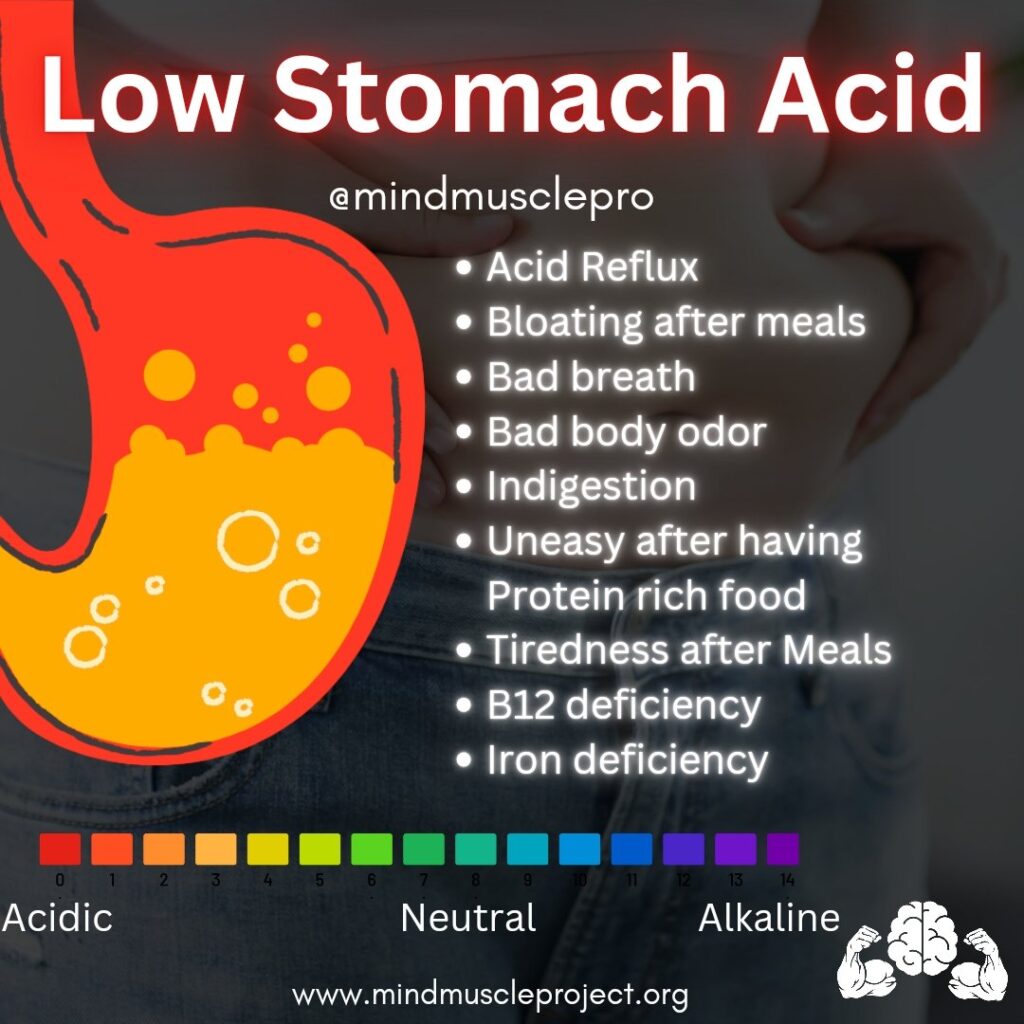Stomach acid plays a pivotal role in your digestive health. Often misunderstood as the cause of heartburn or acid reflux, low stomach acid levels can actually be the root problem behind many digestive and nutrient absorption issues. For optimal health, your stomach acid’s pH should ideally be around 1.5—extremely acidic. When this acidity decreases, digestion and overall gut function take a hit.
Let’s dive into the importance of stomach acid, signs of low stomach acid, and how to naturally improve its levels.
The Critical Functions of Stomach Acid #
Stomach acid, primarily composed of hydrochloric acid (HCl), is essential for breaking down food and supporting overall gut health. Here are its main functions:
- Activating Pepsin for Protein Digestion
- Pepsin is an enzyme crucial for breaking down proteins. Without sufficient stomach acid, this process is impaired.
- Stimulating the Release of Bile and Digestive Enzymes
- Proper stomach acidity signals the release of bile from the gallbladder and digestive enzymes from the pancreas, aiding in fat and carbohydrate digestion.
- Sterilizing Food
- Stomach acid kills harmful pathogens, ensuring food is safe to digest.
- Activating Intrinsic Factor for B12 Absorption
- Without stomach acid, the absorption of vitamin B12—critical for energy production and brain health—is compromised.
- Regulating the Esophageal and Pyloric Sphincters
- It ensures the esophageal sphincter (at the top of the stomach) closes properly, preventing acid reflux.
- It also helps open the pyloric sphincter (at the bottom of the stomach), allowing food to move into the intestines.
The Consequences of Low Stomach Acid #
When stomach acid levels are insufficient, digestion—especially of proteins—becomes incomplete. Large protein molecules that aren’t broken down properly can irritate the gut lining and contribute to leaky gut syndrome (increased intestinal permeability).
Signs of Low Stomach Acid #
Low stomach acid can manifest in several ways, often mimicking symptoms of high acid levels. Common signs include:
- Acid Reflux: Caused by a malfunctioning esophageal sphincter due to low acidity.
- Bloating and Cramping After Meals: Undigested food ferments in the stomach, causing gas and discomfort.
- Bad Breath and Body Odor: Poor digestion allows toxins to linger in the body.
- Undigested Food in Stool: A sign that your food isn’t breaking down properly.
- Difficulty Digesting Protein: Feeling uneasy or tired after eating protein-rich meals.
- Vitamin and Mineral Deficiencies: Particularly B12 and iron, which rely on stomach acid for absorption.
- Tiredness After Meals: A sign your body is overcompensating for poor digestion.
How to Improve Stomach Acid Levels Naturally #
Restoring optimal stomach acid levels doesn’t have to be complicated. Here are simple tips to enhance your stomach’s acidity and improve digestion:
1. Adjust Your Diet #
- Cut Out Sugar and Refined Oils: These disrupt gut health and digestion.
- Limit Grains: Grains can be difficult to digest and may contribute to low stomach acid.
2. Include Stomach-Acid-Boosting Foods #
- Apple Cider Vinegar (ACV): Take 1–2 teaspoons diluted in water before meals to help acid production.
- Ginger: Add fresh ginger to your meals or consume it directly to stimulate acid production.
- Fermented Foods and Drinks: Sauerkraut, kimchi, yogurt, and kombucha support a healthy gut microbiome and digestion.
3. Optimize Eating Habits #
- Avoid Drinking Water with Meals: Too much water can dilute stomach acid. Drink water between meals instead.
- Marinate Meat: Use lemon juice, vinegar, or other acidic marinades to pre-digest proteins.
- Use Whey Protein: Whey is easier to digest compared to other protein sources.
4. Manage Stress #
- Stress reduces stomach acid production. Practice stress-reducing techniques like mindfulness, yoga, or deep breathing.
Supplements to Support Stomach Acid Production #
For severe cases of low stomach acid, certain supplements may help:
- Betaine HCl: A common supplement that can support stomach acid levels.
- Digestive Enzymes: Enhance digestion when stomach acid is low.
Note: Always consult a healthcare professional before starting supplements.
Why Low Stomach Acid is a Concern for the Elderly #
As we age, stomach acid production naturally decreases, making low stomach acid a common issue among the elderly. This can lead to malabsorption of vital nutrients like B12 and iron, increasing the risk of fatigue, anemia, and other health issues. Early intervention with dietary changes and supplements can significantly improve quality of life.
Key Takeaway #
Stomach acid is not the enemy—it’s essential for digestion, nutrient absorption, and overall gut health. Low stomach acid can lead to a range of health issues, but with a few dietary tweaks, stress management, and possibly supplements, you can restore balance.





